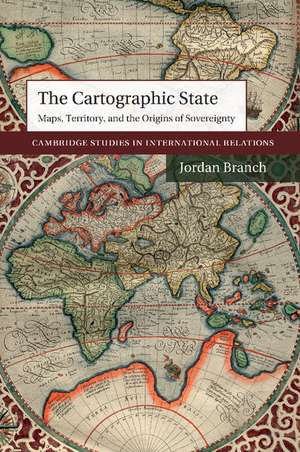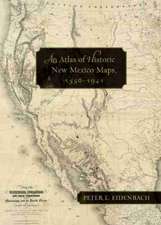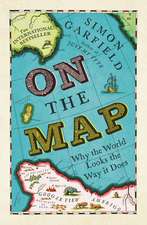The Cartographic State: Maps, Territory, and the Origins of Sovereignty: Cambridge Studies in International Relations, cartea 127
Autor Jordan Branchen Limba Engleză Paperback – 17 dec 2014
| Toate formatele și edițiile | Preț | Express |
|---|---|---|
| Paperback (1) | 201.98 lei 43-57 zile | |
| Cambridge University Press – 17 dec 2014 | 201.98 lei 43-57 zile | |
| Hardback (1) | 692.50 lei 43-57 zile | |
| Cambridge University Press – 27 noi 2013 | 692.50 lei 43-57 zile |
Din seria Cambridge Studies in International Relations
-
 Preț: 200.85 lei
Preț: 200.85 lei -
 Preț: 232.37 lei
Preț: 232.37 lei -
 Preț: 237.58 lei
Preț: 237.58 lei -
 Preț: 198.89 lei
Preț: 198.89 lei -
 Preț: 210.69 lei
Preț: 210.69 lei -
 Preț: 200.41 lei
Preț: 200.41 lei -
 Preț: 190.01 lei
Preț: 190.01 lei - 8%
 Preț: 401.23 lei
Preț: 401.23 lei -
 Preț: 229.56 lei
Preț: 229.56 lei -
 Preț: 265.70 lei
Preț: 265.70 lei -
 Preț: 200.08 lei
Preț: 200.08 lei -
 Preț: 207.81 lei
Preț: 207.81 lei -
 Preț: 158.77 lei
Preț: 158.77 lei -
 Preț: 162.49 lei
Preț: 162.49 lei -
 Preț: 231.47 lei
Preț: 231.47 lei - 11%
 Preț: 584.77 lei
Preț: 584.77 lei -
 Preț: 241.77 lei
Preț: 241.77 lei -
 Preț: 287.87 lei
Preț: 287.87 lei -
 Preț: 209.12 lei
Preț: 209.12 lei -
 Preț: 299.22 lei
Preț: 299.22 lei -
 Preț: 286.13 lei
Preț: 286.13 lei -
 Preț: 287.87 lei
Preț: 287.87 lei - 11%
 Preț: 641.67 lei
Preț: 641.67 lei - 11%
 Preț: 585.78 lei
Preț: 585.78 lei - 14%
 Preț: 843.23 lei
Preț: 843.23 lei -
 Preț: 303.80 lei
Preț: 303.80 lei -
 Preț: 284.78 lei
Preț: 284.78 lei -
 Preț: 279.76 lei
Preț: 279.76 lei -
 Preț: 285.75 lei
Preț: 285.75 lei -
 Preț: 324.24 lei
Preț: 324.24 lei -
 Preț: 290.16 lei
Preț: 290.16 lei -
 Preț: 291.69 lei
Preț: 291.69 lei -
 Preț: 392.52 lei
Preț: 392.52 lei
Preț: 201.98 lei
Nou
Puncte Express: 303
Preț estimativ în valută:
38.65€ • 40.11$ • 32.31£
38.65€ • 40.11$ • 32.31£
Carte tipărită la comandă
Livrare economică 17-31 martie
Preluare comenzi: 021 569.72.76
Specificații
ISBN-13: 9781107499720
ISBN-10: 1107499720
Pagini: 242
Ilustrații: 14 b/w illus.
Dimensiuni: 153 x 230 x 14 mm
Greutate: 0.33 kg
Editura: Cambridge University Press
Colecția Cambridge University Press
Seria Cambridge Studies in International Relations
Locul publicării:New York, United States
ISBN-10: 1107499720
Pagini: 242
Ilustrații: 14 b/w illus.
Dimensiuni: 153 x 230 x 14 mm
Greutate: 0.33 kg
Editura: Cambridge University Press
Colecția Cambridge University Press
Seria Cambridge Studies in International Relations
Locul publicării:New York, United States
Cuprins
1. Introduction; 2. Authority, sovereignty, and international change; 3. The cartographic revolution; 4. Mapping the territorial state; 5. New World mapping and colonial reflection; 6. Peace treaties and political transformation; 7. Mapping the territorialization of France; 8. The cartographic state today.
Recenzii
'This is a fascinating book that retells history of modern cartography from an international relations perspective. As such, Branch skillfully brings together critical interpretations from two areas of scholarship to provide a compelling argument on how the developments of maps and political sovereignty are crucially linked. The primary thesis is that the depiction of bounded spaces on early modern maps preceded modern political practice premised upon bounded spaces. This has important theoretical ramifications for understanding how a uniquely modern form of relations between states was created … This book has stimulated me to engage with its ideas; it presents a very distinctive and distinguished argument that I recommend others to likewise engage with.' Peter J. Taylor, The Cartographic Journal
Notă biografică
Descriere
This book describes the emergence of the territorial state and examines the role that cartography has played in shaping its linear boundaries.











